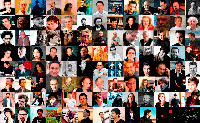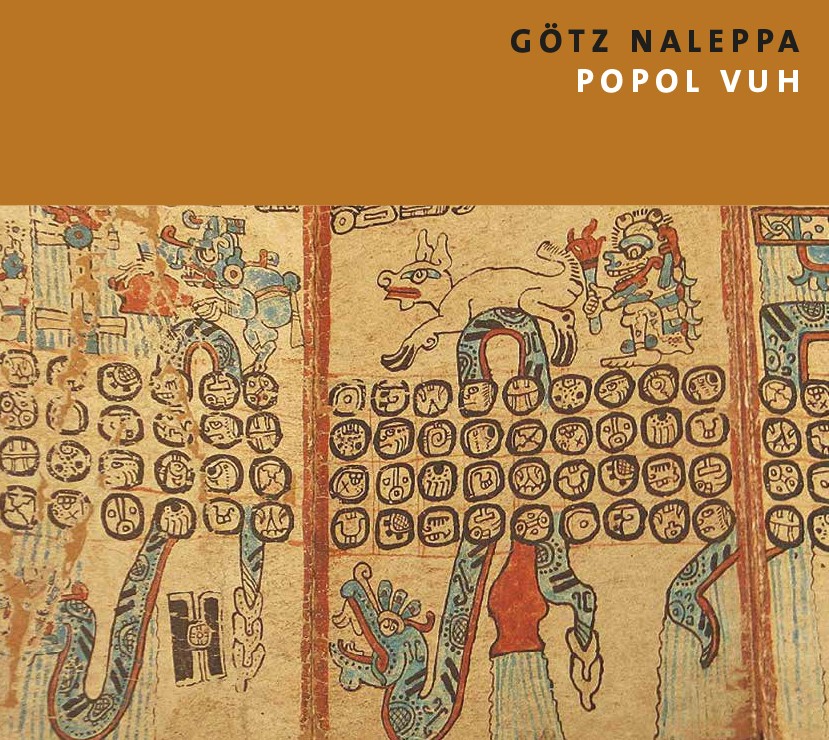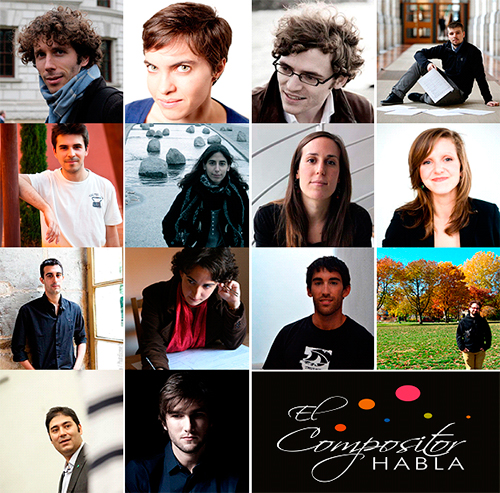Entrevistas
María de Alvear | World Edition Project 11 - Entrevista con Gotz Naleppa
14/04/2021
In 2004, Götz Naleppa was invited to the radio biennial of the Mexican cultural station. At that time, the director of Radio Educación, Lidia Camacho, made him the proposal to produce "Popol Vuh", the book of the Council of Mayan Peoples, for her station. The result is this amazing work by Götz Naleppa.
1. Ruth Prieto: What can you tell us about the project Popol Vuh - das Buch vom Ursprung der Maya
Götz Naleppa: In 2004, I was invited to the radio biennial of the Mexican cultural station "Radio Educación" in Mexico D.F. for lectures and a directing workshop. At that time, the director of Radio Educación, Lidia Camacho, made me the surprising proposal to produce "Popol Vuh", the book of the Council of Mayan Peoples, for her station.
I hesitated - out of respect for the sacred text, because of my limited knowledge of Mayan culture at the time, out of fear of the mammoth task of logistics. But you only get an offer like this once in a lifetime, and so I finally agreed, after I had intensively studied the text. It was clear that Radio Educación could not bear the costs alone, so I organised a co-production with my station at the time, Deutschlandradio Kultur, and the Rundfunk Berlin-Brandenburg.
The longer I looked into the matter, the more I realised that it could not be a classical radio play or a studio production, with Mexican and German actors pretending to be Mayan gods in the studio - that would have been a renewed colonisation of Mayan culture. No, I wanted to record the ancient sacred text on location and with the Maya struggling for their cultural identity in the Mexican province of Chiapas, not as a Western artist who knows everything better, but as a learner and seeker.
Götz Naleppa: In 2004, I was invited to the radio biennial of the Mexican cultural station "Radio Educación" in Mexico D.F. for lectures and a directing workshop. At that time, the director of Radio Educación, Lidia Camacho, made me the surprising proposal to produce "Popol Vuh", the book of the Council of Mayan Peoples, for her station.
I hesitated - out of respect for the sacred text, because of my limited knowledge of Mayan culture at the time, out of fear of the mammoth task of logistics. But you only get an offer like this once in a lifetime, and so I finally agreed, after I had intensively studied the text. It was clear that Radio Educación could not bear the costs alone, so I organised a co-production with my station at the time, Deutschlandradio Kultur, and the Rundfunk Berlin-Brandenburg.
The longer I looked into the matter, the more I realised that it could not be a classical radio play or a studio production, with Mexican and German actors pretending to be Mayan gods in the studio - that would have been a renewed colonisation of Mayan culture. No, I wanted to record the ancient sacred text on location and with the Maya struggling for their cultural identity in the Mexican province of Chiapas, not as a Western artist who knows everything better, but as a learner and seeker.
«This is how my concept came about: not a radio play in the classical sense, but a sound composition for Mayan voices, a narrator, a composition for indigenous instruments and orchestrated by the sounds of the tropical rainforest, the Mayan habitat.»
But this work would not have been possible without my highly skilled team:
Mexican musician Jorge Reyes' collaboration, his knowledge of Mayan culture and his collection of indigenous instruments. It became his last major work - he died in 2009.
Following my composition sketches, he improvisationally created a musical bridge between the text and the sounds of the rainforest.
But the sound quality and transparency of the sound (under the most difficult recording conditions) owes much to the sound engineer Peter Avar (Rundfunk Berlin-Brandenburg), one of the most unusual masters of the microphone and the mixing desk.
Finally, Anja Gundelach, as assistant, has solved the tedious and difficult task of preparing for us a largely original text for the production from among many different (and often falsified and scattered all over the world) versions of the text.
There is not space here to recount the countless adventures of the production weeks in Chiapas: finding the suitable Mayan speakers, motivating the village communities to collaborate - but my concept of bringing back their own sacred text to them always created trust in the end, so that even the last Lacandon shaman, 90-year-old Miguel Alemán, sang a ritual for our play. And the text passages of Popol Vuh, which were translated into two other Mayan languages for us in nightly work, were already circulating on the local radios of the Mayan communities shortly afterwards.
2. R.P.: To what extent is your Popol Vuh -the Book of Counsel a composition and to what extent is it a work of ethnomusicology?
Götz Naleppa: The answer is clear: this work is 100 per cent a sound composition. Even though Jorge Reyes plays ethnic instruments and the piece received the "Gold Award as World's Best Radio Play" at the New York Festival 2008, it is neither a classical "radio play" nor "ethno-music". However, I don't think much of pigeonholes into which music and sound art are sorted - they can only lead to misunderstandings.
3. R.P.: The sound composition Popol Vuh - the Book of the Origin of the Maya by Götz Naleppa is limited to the first part, Book of Counsel. Are you planning to do the rest of the texts?
Götz Naleppa: No. Apart from the fact that it would hardly be possible to organise such a mammoth production a second time and immerse myself in the strange, distant world of the Mayan gods, I already made a conscious decision during the recordings in 2006 to realise "only" the first part, the creation story. This beginning has amazing parallels to the biblical creation story and is therefore more accessible to us.
«And this part already contains at its core everything that made up Mayan culture 500 years ago and also today.»
4. R.P.: Yours is a very eclectic profile and you are one of Europe's leading sound radio artists. To what extent is your work sound art, to what extent is it a radio performance and to what extent is it composition?
Götz Naleppa: My profession is that of a director: theatre, opera and above all radio plays. But already in the 1980s, I was often no longer satisfied with the semantic fixation in radio plays and looked for ways to deal more freely and musically with the recorded sound material. Thus, parallel to the classical radio play, I began my personal path as a sound composer. But since I was still obliged to work for Deutschlandradio until 2008, I was only able to go my own way as an independent sound artist after that. My "Popol Vuh" production pretty much marks the turning point: it is already a sound composition, but the New York Festival awarded it the Gold Award as "world's best radio play" in 2008.
As a freelance sound artist, I published several extensive solo works in the following years - in addition to my work as a director - for which the term "sound composition" is most appropriate (to be read on my website naleppa.eu). Only here was it possible for me to discover and develop my own personal sound language.
.jpg) 5. R.P.: The musicality of the design is a hallmark of your style but is it the most important thing? What are your signs of musical identity?
5. R.P.: The musicality of the design is a hallmark of your style but is it the most important thing? What are your signs of musical identity? Götz Naleppa: The "musicality of the design" often attracted critics' attention in my radio play productions - but of course it is not the main thing in radio plays: it is perhaps the "stage set" in which the characters act.
The second question about my "musical identity" is more difficult. As a composer, I am self-taught (but in good company as an “autodidact”). Instead of a cramped search for identity, I can perhaps offer my musical credo: everything is sound! Voices, a brook, Johann Sebastian Bach, the Rolling Stones, children's laughter, birdcalls - silence. It is the richest compositional material at our disposal (at least since recorders, computers and audio programmes have existed) and goes far beyond classical instruments (which it includes, of course). To "compose" with this sound world of ours (in the literal sense of putting it together, hearing and using assonances and dissonances, filtering out frequencies and details) - that is for me the never-ending task I have embarked upon in my solo works.
6. R.P.: What are we going to discover in this work?
Götz Naleppa: Related to the "Popol Vuh": you can discover the creation story in which the cruel and cosmic-comic of creation becomes tangible.
7. R.P.: When does research stop being fieldwork and becomes sound art?
Götz Naleppa: An interesting question. Indeed, I know quite a few "soundscapes" that remain in the initial position of "field recordings". I can't say it any other way: to become "art", the filtering process of the material through the consciousness of an artist is necessary. However, the possibilities and forms are then almost infinite.
8. R.P.: Why did you want to tell this story and why did you want to tell it with music?
Götz Naleppa: It was an honour to be able to narrate one of the most important texts in human history in my own way. But words, semantics, are only the keynote. The context is told by the music.
9. R.P.: Where are you right now as a composer, as an artist?
Götz Naleppa: Having explored and composed the sounds of 15 bee colonies in my last solo pieces, for example, or narrated my personal sound biography with the help of a random generator, or applied the technique of Asian ZEN painting to city, country and river landscapes - all works with a large compositional arc - I am now about to attempt musical miniatures, which so far are proving to be decidedly humorous. Where this path will take me - I don't know, and am glad not to know.
More information at World Edition
Biblioteca
Destacamos ...
Nueva Sección Directorio
dedicada a la promoción de compositores, intérpretes, instituciones y editoriales.

dedicada a la promoción de compositores, intérpretes, instituciones y editoriales.




